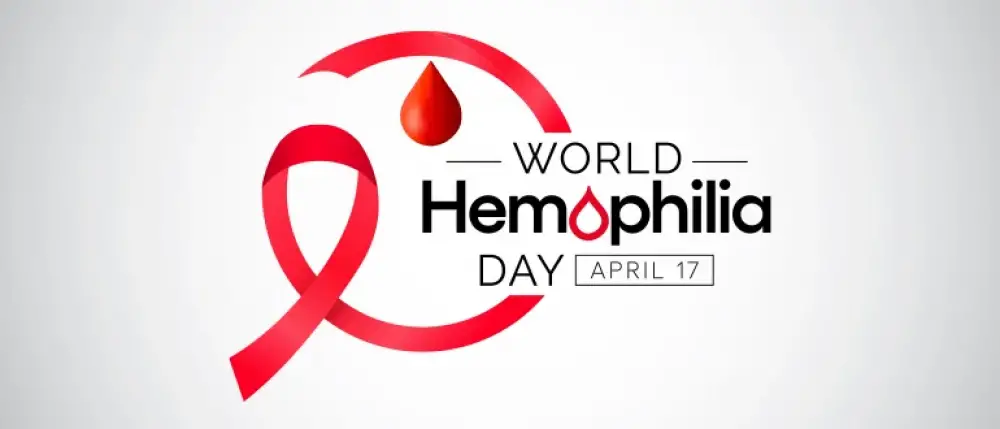Haemophilia is a rare genetic condition that affects the blood's ability to clot. This condition causes prolonged bleeding during surgery or an injury. In severe cases, internal bleeding can damage organs, leading to death. To raise awareness about Haemophilia, World Haemophilia Day is celebrated on April 17th every year, on the birth anniversary of Frank Schnabel, the founder of the World Federation of Haemophilia (WFH). Frank Schnabel was born with severe haemophilia and established WFH to work in the interest of people suffering from haemophilia and other bleeding disorders.
This blog post aims to provide valuable insights into the symptoms, causes, and types of haemophilia. It also focuses on the importance of Haemophilia Awareness Day, highlighting the significance of spreading awareness about this medical condition.
What is Haemophilia: Symptoms, Causes and Types
Caused by a deficiency or absence of clotting proteins or clotting factors results in reduced blood clotting. This genetic bleeding disorder makes bleeding persist longer after an injury or surgery. The bleeding disorder may range from mild to severe, depending on the symptoms and the level of clotting factors. In severe cases, internal bleeding in the joints like knee, elbow, and ankle can be life-threatening.
Symptoms of Haemophilia
In mild cases, bleeding occurs only after a trauma or surgery. However, in severe cases, bleeding occurs easily. Some common symptoms include:
- Bruising
- Excessive bleeding from injuries or cuts during a surgery or a dental procedure.
- Bleeding after vaccinations.
- Pain, inflammation, and stiffness in joints
- Nosebleeds
- Blood in urine or stool
Causes of Haemophilia
In this condition, the body produces insufficient clotting proteins, factor VIII or factor IX. People suffering from haemophilia are prone to internal bleeding. Haemophilia is more common in males because the genetic mutation affects the X chromosome, and males have only one X chromosome. Females are normally carriers with no or mild symptoms such as bruising.
Types of Haemophilia
There are four types of haemophilia :
Type A Haemophilia: Also known as Classic Haemophilia, it occurs due to the absence or low level of clotting factor VIII and is the most common type of haemophilia.
Type B Haemophilia: Also known as Christmas Disease, it occurs due to the absence or low level of clotting factor IX. Type B haemophilia is less severe than type A and four times less common.
Type C Haemophilia: It is a rare type of haemophilia, also known as Rosenthal disease. It is caused by a mutation of clotting factor XI. It is less severe than type A and type B. It affects men and women equally because it is not present on the sex-determining chromosome.
Acquired Haemophilia: This type of haemophilia is not a genetic disorder but an autoimmune disease. It happens when the immune system does not recognise clotting factors and produces antibodies to attack the clotting proteins and prevent their normal function. It is the rarest type of haemophilia.
World Haemophilia Day 2025 Theme
The theme for this year’s event is ‘Access For All: Women and Girls Bleed Too.’
Women and girls are still underdiagnosed and underserved. Only 100,000 girls and women have been identified with haemophilia or other bleeding disorders worldwide. So, this year, the day will be celebrated to close the gaps in care for girls and women with any kind of bleeding disorders. The aim is to acknowledge delayed diagnoses, limited access to treatment and a lack of understanding of their unique needs. Timely recognition, diagnosis, care and treatment will enhance their quality of life.
Why do We Celebrate World Haemophilia Day?
According to WFH, around 75% of individuals suffering from haemophilia are not yet diagnosed. Hence, World Haemophilia Day is celebrated to bring these people to mind and address concerns and problems faced by people living with haemophilia. The World Haemophilia Day is celebrated to:
- Create awareness about haemophilia and other genetic bleeding disorders.
- Provide guidelines that different organisations can adapt from different regions to support people with haemophilia.
- Provide better diagnosis and healthcare access to haemophilic people living without treatments.
How to Cure Haemophilia?
There is no cure for haemophilia as it is a genetic disorder. However, replacing the clotting factor during a bleeding episode helps control bleeding. It is done by injecting clotting factors into the veins. The treatment product can be used for episodic care to stop bleeding during an episode or for prophylactic care to prevent bleeding by regularly infusing the clotting factors.
Living a Normal Life with Haemophilia!
Living with haemophilia can be quite challenging, as it can make even the simplest daily tasks difficult to perform. However, with medical advancements, modern treatments like gene therapy may be able to cure the disorder in the future. Regular physical exercise, a balanced diet, and proper nutrition can help people with haemophilia lead normal lives.
Not to forget, haemophilia is a rare disorder; hence, treatment costs are high because it requires pre- and post-hospitalisation care, regular monitoring, and expensive medication. Comprehensive health insurance coverage can help reduce the financial burden caused by expensive treatments and ensure access to quality healthcare.
Let us take care of all your worries related to treatment expenses. One of our popular plans, Care Secure, provides comprehensive coverage for hospitalisation due to accidental injuries, while Care Operation Mediclaim covers all the costs associated with surgeries. Visit the company website or connect with our insurance experts to understand the coverage options available if you or your loved ones are dealing with a rare bleeding disorder.
>> Also Read: How to avail of medical check-ups under your health cover?
Disclaimers: Plan features, benefits, coverage, and claims underwriting are subject to policy terms and conditions. Kindly refer to the brochure, sales prospectus, and policy documents carefully.
